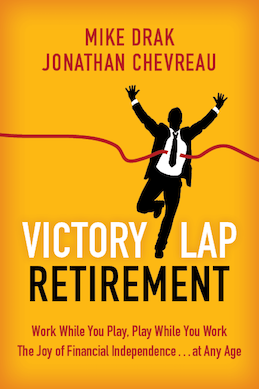People may not love their current job, but they don’t actually dislike working, and trading a productive workday in for one filled with TV reruns upon retirement is detrimental to both your finances and your health.
That’s an argument Jonathan Chevreau and Mike Drak convincingly make in Victory Lap Retirement, a book that invites readers to re-imagine what their post-work years could look like – and to lay out a roadmap for getting there.
“We think that the financial industry has, in its advertising, sort of oversold retirement as this permanent vacation … but you can’t confuse a two week vacation with what could be potentially 30 years of post-corporate life,” Chevreau said in an interview.
“There’s still the same number of hours to fill (in a day) … and our feeling is that the only thing you can really do eight hours a day apart from sleep is work, or at least meaningful work. It doesn’t have to be necessarily paid work.”
Chevreau and Drak offer engaging examples and practical advice about how to properly plan ahead and save, while reminding readers that financial independence is the key to a new type of “Freedom 55” – not one in which you check into a beach resort for life, like the famous 1990s commercials promised, but one in which you can do work you actually enjoy.
Your retirement “job” could involve delivering pet food and mowing lawns, like Drak’s dad did after a successful corporate career, starting a new business, or teaching art classes – it can be anything you want it to be, as long as you choose it consciously and because it brings value to your life.
Ideally, it will also bring a bit of extra income to supplement existing revenue streams like a pension or investments.
Chevreau points to a summer craft fair near Peterborough, Ont., where a number of retired teachers with good pension plans sell their paintings or crafts at good prices: “They’re actually making a nice auxiliary stream of income, but more to the point, they are occupying their time in a positive way and fulfilling their dreams that they may have long-suppressed while they were working to make money,” he said in the interview.
“They’re actually making a nice auxiliary stream of income, but more to the point, they are occupying their time in a positive way and fulfilling their dreams that they may have long-suppressed while they were working to make money,” he said in the interview.
Victory Lap is primarily aimed at such Boomers, but it also offers advice for younger workers.
“Millennials shouldn’t even use the term retirement – think instead of financial independence, or `findependence,’ which can happen,” Chevreau said.
“The millennials need to take lessons from the Victory Lap and say, what can I do to be ‘findependent’ in my 30s, whether that means maximizing your Tax-Free-Savings account … or getting rid of all consumer debt and credit card debt and ultimately getting rid of mortgage debt.”
The idea of “findependence,” which was fictionalized in an earlier book by Chevreau titled “Findependence Day,” was merged with Drak’s concept of a “victory lap” to create a book that is part financial education, part career coach and part philosophy – which fits right in with the holistic approach to financial and retirement planning the authors advocate.
It’s a great read for anyone wishing to plan ahead, or simply looking to achieve some work-life balance.


